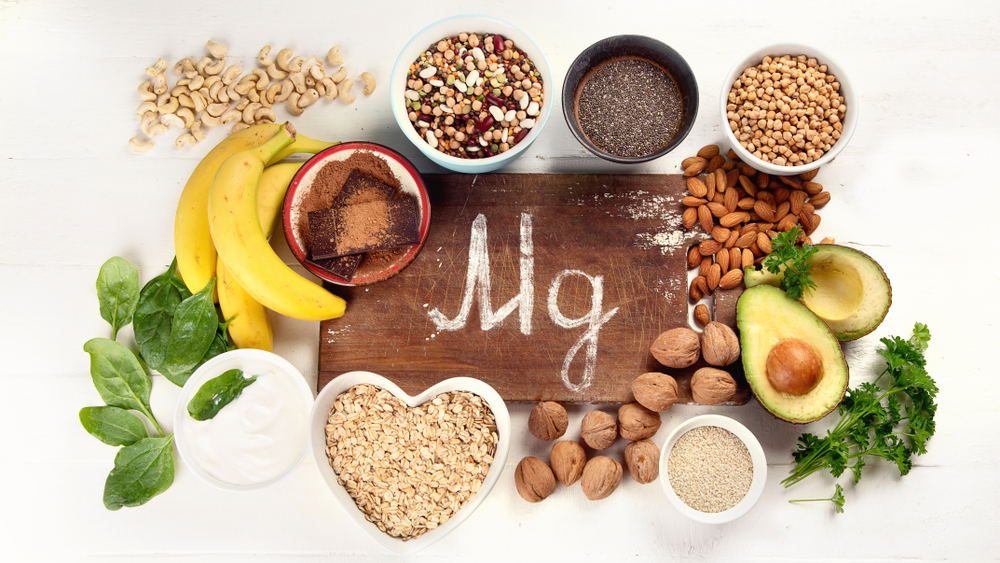The Power of Nature: Magnesium-Rich Foods and Stress Reduction

Table of Contents
Imagine harnessing the natural power of magnesium-rich foods to reduce stress and restore balance in your life. In this article, we’ll explore the holistic benefits of incorporating magnesium-rich foods into your diet, and learn how this simple dietary change can have a profound impact on your overall well-being and stress management. Let’s dive into the world of holistic stress reduction and discover the transformative potential of magnesium-rich foods.
Understanding Magnesium and Stress

Have you ever felt like stress was running the show in your life? You’re not alone, and the solution might just be found on your dinner plate. Magnesium, a mighty mineral, plays a starring role in keeping our stress in check. It helps to regulate our body’s stress response, and when we’re low on magnesium, those feelings of tension can ramp up. Getting enough of this nutrient can be a game-changer for our mental state. Let’s look at how this understated mineral keeps us steady in the face of daily pressures.
The Role of Magnesium in Stress Regulation
Have you ever wondered why some people seem super chill, even when life throws curveballs their way? Well, magnesium might just be their secret! This mighty mineral plays a big role in helping our bodies manage stress. It’s like a superhero for our nervous system, working behind the scenes to keep our reactions in sync.
So, how does it pull off this amazing feat? Magnesium helps control our brain’s nerves and messengers. It keeps our stress-response system in check so that we don’t go into overdrive. When our magnesium levels are up to par, it’s like having a built-in stress buffer to help us stay cool and collected.
The Link Between Magnesium Deficiency and Stress
Did you know that your body’s magnesium levels and stress are connected? It’s true! Magnesium plays a huge role in controlling stress response within the body. When you’re low on magnesium, your body can have a tough time managing stress. This can lead to feelings of anxiety and even disrupt your sleep.
Research has shown that a lack of magnesium can crank up the stress hormones in your system. Without enough magnesium, your brain’s receptors related to stress can become hypersensitive, making the body feel stressed even when there’s no actual stress happening. So, by keeping your magnesium levels in check, you can help keep your stress levels down too.
Top Magnesium-Rich Foods for Stress Reduction

Imagine calming your stress away, bite by bite, with everyday foods. It’s not just a dream—a variety of delicious, magnesium-packed goodies can help manage your stress levels. This nutritional powerhouse plays a key role in soothing our nerves and keeping our stress responses in check. Now, let’s explore some of nature’s top picks that are not just good for your body, but are also your allies in the battle against stress.
Leafy Greens: Nature’s Magnesium Powerhouses
Have you ever wondered which foods are jam-packed with magnesium? Look no further than the vibrant, leafy greens section in your grocery store. Spinach, kale, and Swiss chard are like the superheroes of the vegetable world when it comes to their magnesium content. Just one cup of cooked spinach can give your body a good chunk of the magnesium it needs for the day!
Adding these nutritious greens to your plate isn’t just about the magnesium; it’s also about the boatload of other benefits they bring. These leafy wonders are not only great for stress reduction, but they’re also loaded with vitamins and minerals that support overall health. It’s like getting a natural chill pill wrapped up in a delicious green package. So next time you’re looking to de-stress, consider reaching for a fresh salad or a side of sautéed greens to help keep your magnesium levels, and your cool, right where they should be.
Nuts and Seeds: Portable Stress-Relief Snacks
Sometimes, the best solutions are the simplest ones, and when it comes to managing stress, munching on nuts and seeds can be a game-changer. They’re not just convenient and tasty; these little snacks are packed with magnesium, which plays a crucial part in calming your nervous system and managing stress levels. Almonds, cashews, and pumpkin seeds are among the top choices that you can easily include in your daily snack routine.
Just a handful of these power-packed treats can make a noticeable difference. Toss some into your backpack or desk drawer, and you’ve got a quick go-to source of magnesium whenever stress starts to knock on your door. Besides their stress-reducing benefits, nuts and seeds are also full of healthy fats and fiber, which help keep your energy levels stable throughout the day. Remember, balance is key, so mix it up with a variety of nuts and seeds to keep things interesting and to enjoy the broad spectrum of nutrients they offer.
Whole Grains: Nutrient-Packed Stress Busters
Whole grains are a treasure in your pantry, especially when it comes to kicking stress to the curb. These mighty little morsels pack not just a punch of magnesium but a whole bunch of other nutrients that your body loves. Chomping down on whole grains helps your body manage stress more effectively, and they’re pretty tasty to boot.
Let’s talk about some stars of the whole grain world. Oats, quinoa, and brown rice are like the superheroes in your stress-fighting arsenal. Oats give you a cozy, comforting vibe with their creamy texture, making them perfect for starting your day on a chilled-out note. Quinoa, with its nutty flavor, is a complete protein, which means it’s loaded with all those amino acids your body craves. And then there’s brown rice, the dependable and versatile buddy that goes with just about anything. Each of these grains brings its own unique blend of vitamins, minerals, and fiber, making your path to tranquility as delicious as it is nutritious.
Incorporating Magnesium-Rich Foods into Your Diet

Embracing a diet that is abundant in magnesium is like giving your body a suit of armor against stress. Transforming your meals to include this vital nutrient can have remarkable benefits for your mind and body, opening the door to a more serene and balanced lifestyle. Let’s uncover how to skillfully weave these wholesome foods into your daily eating habits, ensuring each bite contributes to your journey toward stress-free living.
Delicious and Nutritious Recipes to Add More Magnesium to Your Meals
Adding more magnesium to your diet can be both yummy and beneficial. It’s not just about eating right; it’s about enjoying what you eat while giving your body what it needs. Leafy greens like spinach can be the star of a smoothie, or a handful of pumpkin seeds can add crunch to your oatmeal.
Want a boost with your burger? Swap out the bun for a portobello mushroom cap, which is loaded with magnesium. Or make a stir-fry and use quinoa instead of rice to pack more of this mighty mineral into your dinner. The key is to find fun and flavorful ways to include these superfoods in your meals without it feeling like a chore.
Smart Meal Planning for Stress-Free Nutrition
Staying on top of your nutrition doesn’t have to be a stressful task, especially when it comes to ensuring you’re getting enough magnesium. Smart meal planning can be your secret weapon in this battle against stress. By preparing your meals in advance, you can guarantee that nutrient-dense, magnesium-rich foods find their way into your daily diet without the last-minute rush.
Planning your meals ahead of time can also save you from the all-too-common snack trap. Often, when stress hits, it’s easy to reach for sugary treats or salty snacks. But when you’ve got a fridge full of pre-prepped veggies, cooked whole grains, and a stash of nuts and seeds, you’re equipped with the right arsenal to fend off stress-induced cravings. Start with small steps like cutting up leafy greens for an easy salad base or prepping portions of quinoa and almonds that can be tossed into any meal for an extra magnesium boost. With a little organization and creativity, your meal plan will have you sailing through the week with one less thing to worry about.
Supplementing Magnesium Intake for Optimal Stress Management

Sometimes, even with the best intentions, your daily menu might not pack enough of that magical mineral, magnesium. To keep stress at bay, you can give your body a little extra help with supplements. This not so secret weapon is like a backup dancer to your diet, making sure your stress reduction routine never misses a beat. Let’s explore the different forms of magnesium supplements and how they can fit into a stress-less lifestyle.
Exploring Different Forms of Magnesium Supplements
When you’re aiming to boost your magnesium levels, you have more options than just what you find on your plate. Supplements are a convenient way to ensure you’re getting enough of this essential mineral. But not all supplements are created equal. Magnesium comes in several different forms, each with its specific strengths and uses.
For instance, magnesium citrate is known for its easy absorption and is often recommended for those dealing with constipation. Magnesium glycinate, on the other hand, is praised for its calming properties and can be a go-to option for better sleep and stress reduction. If you’re after bone health, magnesium carbonate might be your best bet, whereas magnesium oxide offers a high level of magnesium per dose, making it economical but a bit harder on the stomach.
Before you pick a supplement, it’s a good idea to talk with a healthcare provider. They can help you understand which form of magnesium is best for your personal health goals and ensure that you’re taking a safe and effective dose. Remember, supplements should complement your diet, not replace it!
Understanding the Role of Supplements in Holistic Stress Reduction
Sometimes, even with the best intentions, your diet may not give you all the magnesium your body craves for. That’s where magnesium supplements step in as your stress-busting sidekicks. They can fill the gaps in your nutrition and ensure you’re getting the right amount to keep your stress levels in check.
Supplements come in various forms like tablets, capsules, powders, and even topical treatments such as oils and lotions. But remember: not all supplements are created equal. Quality and absorption rates can vary, so it’s crucial to choose forms that your body can use effectively, like magnesium citrate or glycinate. It’s a good idea to chat with a healthcare provider before adding any supplement to your diet, just to make sure it fits seamlessly into your holistic path to tranquility.
Lifestyle Changes to Enhance Magnesium Absorption

Are you looking to get the most out of the magnesium-packed foods in your diet? It’s not just about what you eat; it’s also about how you live your life. Small tweaks to your daily habits can significantly boost magnesium absorption, enhancing its stress-reducing benefits. Let’s unwrap some lifestyle choices that can ramp up the effectiveness of those nutrient-rich greens and nuts you’ve been munching on.
The Role of Physical Activity in Magnesium Absorption
Believe it or not, moving your body is not just great for building muscles or burning calories; it plays a crucial part in how effectively your body absorbs magnesium, an essential mineral that we often don’t get enough of. When we exercise, our bodies work harder, our blood flows faster, and this actually boosts how well magnesium is taken up by our cells. It’s like giving your body a head start in the magnesium absorption race.
In simple terms, regular physical activity ensures that the magnesium you get from all those leafy greens and seeds doesn’t just pass through your system—it’s used efficiently. So, when you pair a brisk walk or a bike ride with a magnesium-rich snack, you’re not just pumping up your heart rate, you’re setting the stage for a stress-busting nutrient to get where it needs to go. Remember, a well-nourished body can handle stress much better, and that’s a win-win for your health and your peace of mind.
Stress-Reducing Practices to Support Magnesium Absorption
Have you heard that calming activities can actually boost how your body absorbs nutrients? That’s right – some simple stress-reducing practices can help your body make the most of magnesium’s benefits. Magnesium is a bit like a superhero for our nerves and muscles, keeping them relaxed, but even superheroes need a sidekick. That’s where these practices come in.
Get moving with some light exercise. It doesn’t have to be a full-on workout – just a brisk walk or a bit of yoga can do the trick. Exercise encourages circulation, meaning that the magnesium from your diet makes it to where it’s needed most. Moreover, when you’re more relaxed, your gut health can improve, leading to better absorption of all that goodness from magnesium-packed foods. Think of it as a double win for your stress levels and your nutrition!
Conclusion
With the wisdom of nature as our guide, we have unlocked the potential of magnesium-rich foods in the journey towards holistic stress reduction. By understanding the role of magnesium in stress regulation, discovering the top magnesium-rich foods, and learning how to incorporate them into your diet, you can embark on a transformative path to greater well-being. Embrace the natural power of magnesium-rich foods, and let the wisdom of holistic stress reduction guide you toward a more balanced and resilient life.
FAQs
Q: How does magnesium reduce stress?
A: Magnesium plays a crucial role in the body’s stress response system. It helps regulate the release of stress hormones, such as cortisol, and promotes relaxation by influencing the activity of neurotransmitters. Additionally, magnesium helps maintain proper muscle function and may alleviate physical symptoms associated with stress, such as muscle tension.
Q: Which magnesium is best for stress?
A: Magnesium comes in various forms, and the best one for stress may depend on individual preferences and needs. Magnesium citrate, magnesium glycinate, and magnesium taurate are often recommended for stress due to their higher bioavailability and calming effects. It’s advisable to consult with a healthcare professional to determine the most suitable form and dosage for your specific situation.
Q: How do you break chronic stress?
A: Breaking chronic stress involves adopting a multi-faceted approach. Strategies may include practicing stress-reducing techniques such as meditation and deep breathing, engaging in regular physical activity, establishing a healthy sleep routine, seeking social support, and addressing any underlying issues through therapy or counseling. Lifestyle changes, such as time management and setting realistic goals, can also contribute to breaking the cycle of chronic stress.
Q: Is Nature Made magnesium good for anxiety?
A: Nature Made is a well-known brand that produces various supplements, including magnesium. Whether Nature Made magnesium is good for anxiety depends on the specific product and its formulation. Magnesium supplements in general are often recommended for anxiety, but it’s essential to consult with a healthcare professional to determine the appropriate dosage and form based on individual health needs.
Q: What is the best vitamin for stress and anxiety?
A: B vitamins, particularly B-complex vitamins, are often associated with stress and anxiety reduction. Vitamins such as B1 (thiamine), B3 (niacin), B6 (pyridoxine), B9 (folate), and B12 (cobalamin) play roles in neurotransmitter synthesis and energy metabolism, contributing to overall mental well-being. However, it’s crucial to maintain a balanced diet and consider individual health needs when choosing supplements.
Q: What magnesium is best for anxiety and depression?
A: Magnesium glycinate is often recommended for anxiety and depression due to its high bioavailability and potential calming effects. However, individual responses to magnesium supplements vary, and it’s advisable to consult with a healthcare professional to determine the most suitable form, dosage, and overall approach to managing anxiety and depression. Lifestyle factors and other therapeutic interventions may also be considered in conjunction with magnesium supplementation.
Useful resources
- National Institute of Mental Health (NIMH) – Stress:
- Website: NIMH – Stress
- Description: The NIMH provides comprehensive information on stress, its effects on mental health, and strategies for managing stress. The website offers evidence-based resources and articles.
- Mayo Clinic – Magnesium Supplements:
- Website: Mayo Clinic – Magnesium Supplements
- Description: Mayo Clinic is a reputable medical institution that offers insights into magnesium supplementation, including its benefits, recommended dosage, and potential risks. It’s a reliable resource for understanding the role of magnesium in health.
- Psychology Today – Stress Management:
- Website: Psychology Today – Stress Management
- Description: Psychology Today provides a variety of articles and resources on stress management, covering topics such as stress reduction techniques, coping strategies, and the impact of stress on mental health.
- Anxiety and Depression Association of America (ADAA):
- Website: ADAA
- Description: ADAA is a non-profit organization dedicated to the prevention, treatment, and cure of anxiety, depression, and related disorders. The website offers valuable information, resources, and support for individuals dealing with anxiety and depression.








For the reason that the admin of this site is working, no uncertainty very quickly it will be renowned, due to its quality contents.
Thank you so much for your kind words! I truly appreciate your positive feedback on my blog post. I’m glad to hear that you find the content valuable.
I loved even more than you will get done right here. The picture is nice, and your writing is stylish, but you seem to be rushing through it, and I think you should give it again soon. I’ll probably do that again and again if you protect this walk.
Thank you so much for your thoughtful feedback! I’m delighted that you enjoyed the post and appreciate your compliments on the picture and writing style. Your observation about the pacing is valuable, and I’ll definitely take it into consideration. I’m always looking to improve, and your input motivates me to revisit the topic and ensure I provide even more in-depth content in the future. Thanks again for taking the time to share your thoughts—I look forward to creating more content that you’ll enjoy.
Your article helped me a lot, is there any more related content? Thanks!
thank you for your comment.
you can check our articles on the website
Your article helped me a lot, is there any more related content? Thanks!